Analysis of Cape Town's Tourism Impact on the Environment and Strategy
VerifiedAdded on 2020/12/30
|8
|2208
|219
Report
AI Summary
This report provides a comprehensive analysis of the impact of international tourism and hospitality on Cape Town's ecological ecosystem. It examines the city's geographical features, rich biodiversity, and the challenges posed by the water crisis, highlighting the depletion of water resources due to tourism activities, infrastructure development, and pollution. The report further explores the negative impacts on soil fertility, deforestation, and endangered species, as well as various forms of pollution including air, noise, and waste. It then discusses the need for environmental strategies, including waste management, water conservation, and the implementation of environmental policies. The report concludes by emphasizing the importance of eco-tourism and the need for a balance between tourism, economic development, and environmental sustainability, offering recommendations for sustainable practices to protect Cape Town's cultural heritage and ecological well-being.
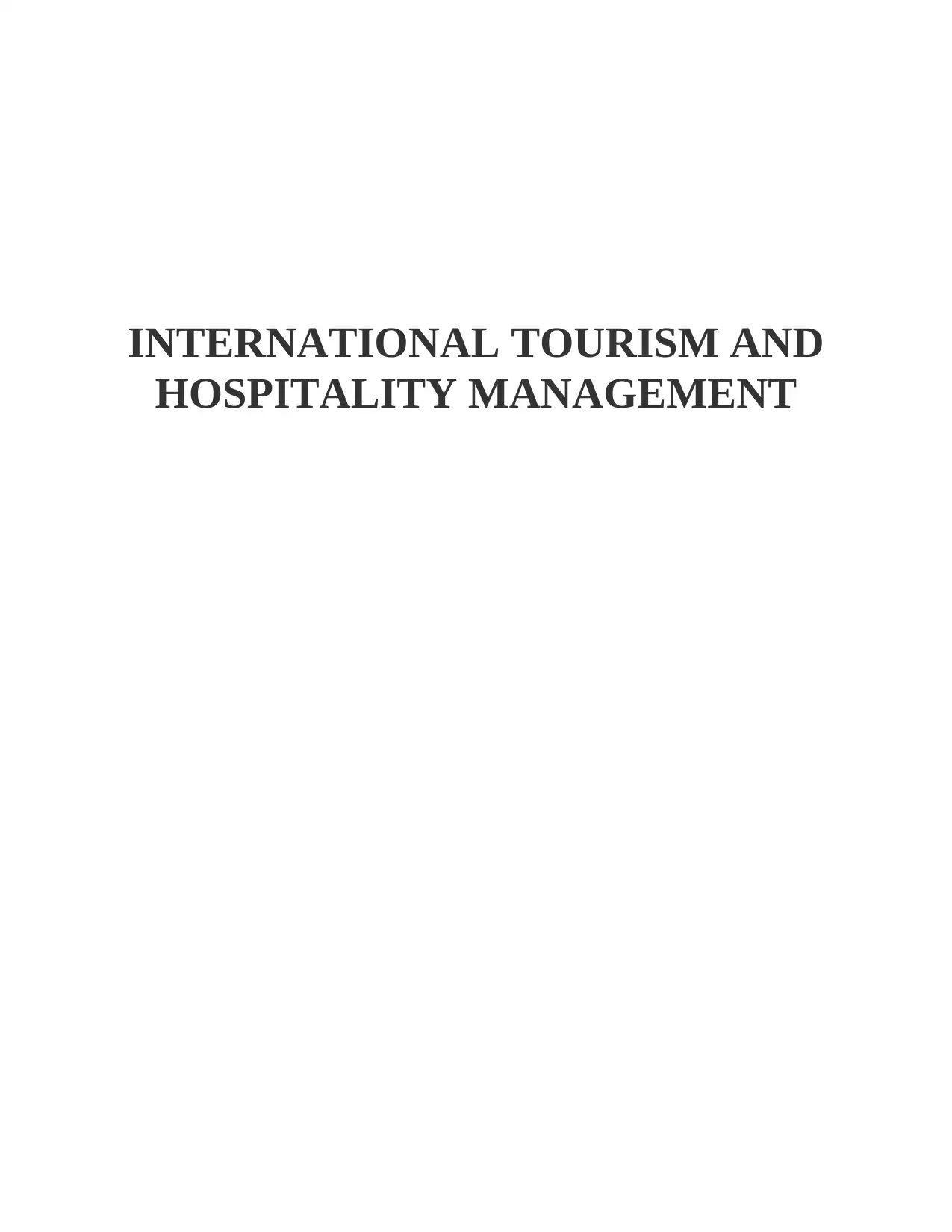
INTERNATIONAL TOURISM AND
HOSPITALITY MANAGEMENT
HOSPITALITY MANAGEMENT
Paraphrase This Document
Need a fresh take? Get an instant paraphrase of this document with our AI Paraphraser
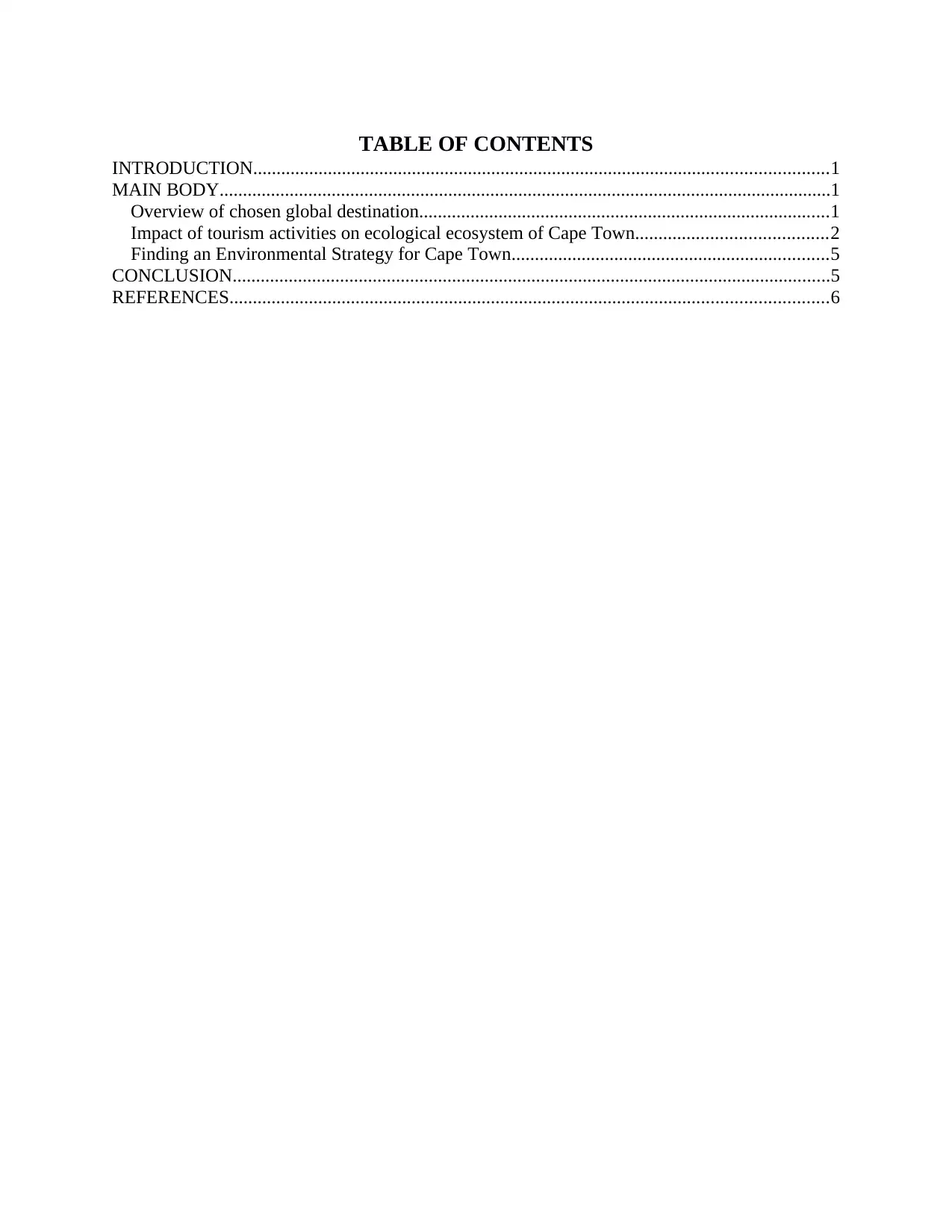
TABLE OF CONTENTS
INTRODUCTION...........................................................................................................................1
MAIN BODY...................................................................................................................................1
Overview of chosen global destination........................................................................................1
Impact of tourism activities on ecological ecosystem of Cape Town.........................................2
Finding an Environmental Strategy for Cape Town....................................................................5
CONCLUSION................................................................................................................................5
REFERENCES................................................................................................................................6
INTRODUCTION...........................................................................................................................1
MAIN BODY...................................................................................................................................1
Overview of chosen global destination........................................................................................1
Impact of tourism activities on ecological ecosystem of Cape Town.........................................2
Finding an Environmental Strategy for Cape Town....................................................................5
CONCLUSION................................................................................................................................5
REFERENCES................................................................................................................................6
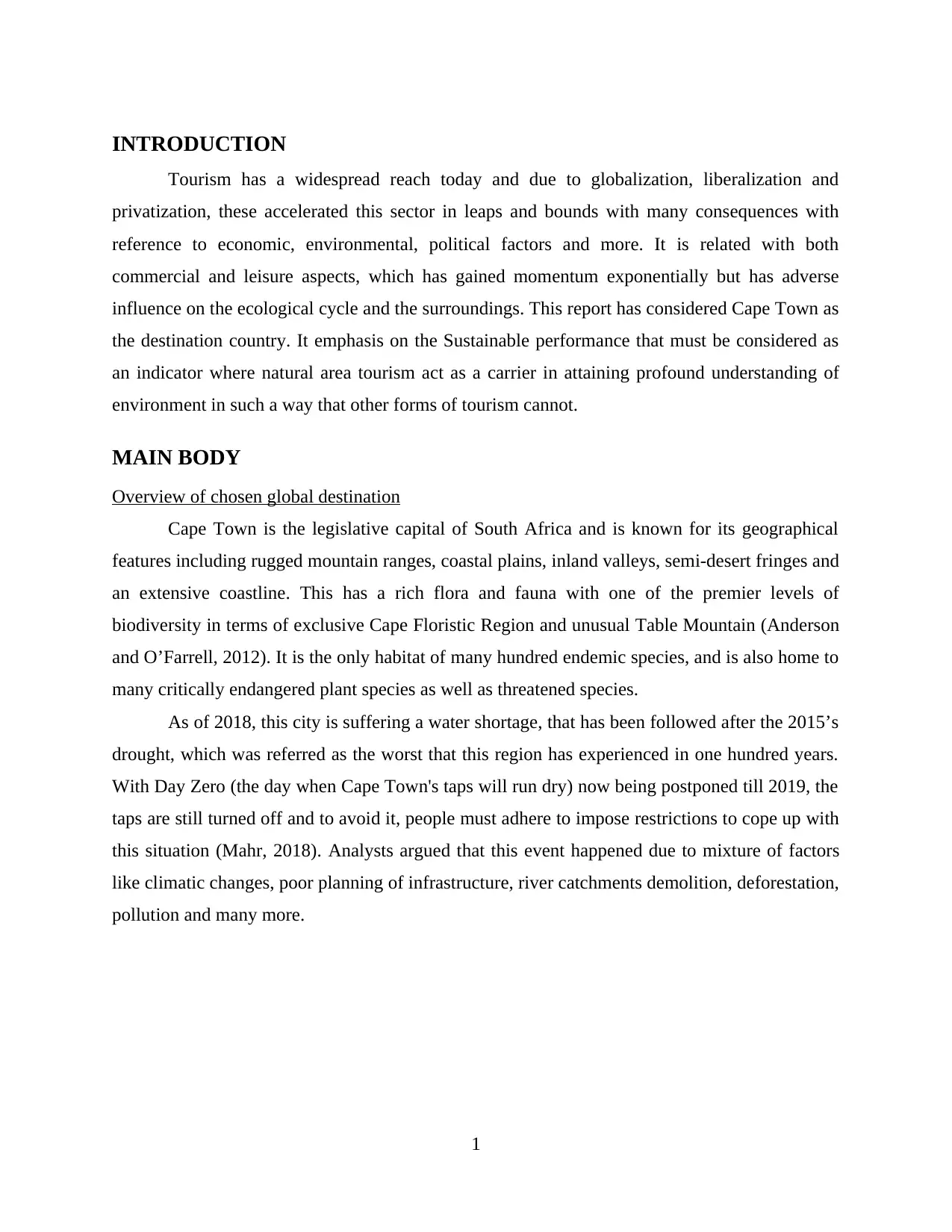
INTRODUCTION
Tourism has a widespread reach today and due to globalization, liberalization and
privatization, these accelerated this sector in leaps and bounds with many consequences with
reference to economic, environmental, political factors and more. It is related with both
commercial and leisure aspects, which has gained momentum exponentially but has adverse
influence on the ecological cycle and the surroundings. This report has considered Cape Town as
the destination country. It emphasis on the Sustainable performance that must be considered as
an indicator where natural area tourism act as a carrier in attaining profound understanding of
environment in such a way that other forms of tourism cannot.
MAIN BODY
Overview of chosen global destination
Cape Town is the legislative capital of South Africa and is known for its geographical
features including rugged mountain ranges, coastal plains, inland valleys, semi-desert fringes and
an extensive coastline. This has a rich flora and fauna with one of the premier levels of
biodiversity in terms of exclusive Cape Floristic Region and unusual Table Mountain (Anderson
and O’Farrell, 2012). It is the only habitat of many hundred endemic species, and is also home to
many critically endangered plant species as well as threatened species.
As of 2018, this city is suffering a water shortage, that has been followed after the 2015’s
drought, which was referred as the worst that this region has experienced in one hundred years.
With Day Zero (the day when Cape Town's taps will run dry) now being postponed till 2019, the
taps are still turned off and to avoid it, people must adhere to impose restrictions to cope up with
this situation (Mahr, 2018). Analysts argued that this event happened due to mixture of factors
like climatic changes, poor planning of infrastructure, river catchments demolition, deforestation,
pollution and many more.
1
Tourism has a widespread reach today and due to globalization, liberalization and
privatization, these accelerated this sector in leaps and bounds with many consequences with
reference to economic, environmental, political factors and more. It is related with both
commercial and leisure aspects, which has gained momentum exponentially but has adverse
influence on the ecological cycle and the surroundings. This report has considered Cape Town as
the destination country. It emphasis on the Sustainable performance that must be considered as
an indicator where natural area tourism act as a carrier in attaining profound understanding of
environment in such a way that other forms of tourism cannot.
MAIN BODY
Overview of chosen global destination
Cape Town is the legislative capital of South Africa and is known for its geographical
features including rugged mountain ranges, coastal plains, inland valleys, semi-desert fringes and
an extensive coastline. This has a rich flora and fauna with one of the premier levels of
biodiversity in terms of exclusive Cape Floristic Region and unusual Table Mountain (Anderson
and O’Farrell, 2012). It is the only habitat of many hundred endemic species, and is also home to
many critically endangered plant species as well as threatened species.
As of 2018, this city is suffering a water shortage, that has been followed after the 2015’s
drought, which was referred as the worst that this region has experienced in one hundred years.
With Day Zero (the day when Cape Town's taps will run dry) now being postponed till 2019, the
taps are still turned off and to avoid it, people must adhere to impose restrictions to cope up with
this situation (Mahr, 2018). Analysts argued that this event happened due to mixture of factors
like climatic changes, poor planning of infrastructure, river catchments demolition, deforestation,
pollution and many more.
1
⊘ This is a preview!⊘
Do you want full access?
Subscribe today to unlock all pages.

Trusted by 1+ million students worldwide
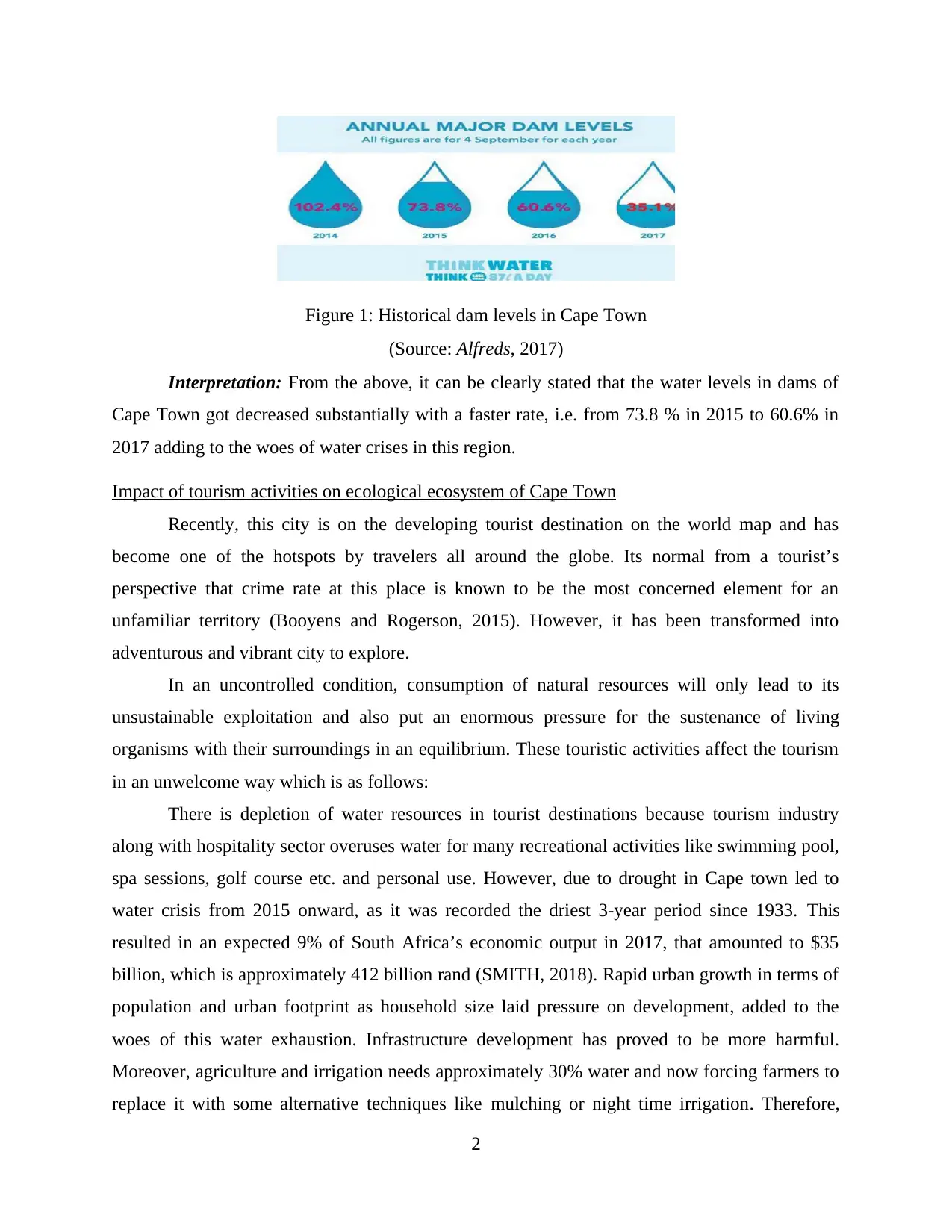
Figure 1: Historical dam levels in Cape Town
(Source: Alfreds, 2017)
Interpretation: From the above, it can be clearly stated that the water levels in dams of
Cape Town got decreased substantially with a faster rate, i.e. from 73.8 % in 2015 to 60.6% in
2017 adding to the woes of water crises in this region.
Impact of tourism activities on ecological ecosystem of Cape Town
Recently, this city is on the developing tourist destination on the world map and has
become one of the hotspots by travelers all around the globe. Its normal from a tourist’s
perspective that crime rate at this place is known to be the most concerned element for an
unfamiliar territory (Booyens and Rogerson, 2015). However, it has been transformed into
adventurous and vibrant city to explore.
In an uncontrolled condition, consumption of natural resources will only lead to its
unsustainable exploitation and also put an enormous pressure for the sustenance of living
organisms with their surroundings in an equilibrium. These touristic activities affect the tourism
in an unwelcome way which is as follows:
There is depletion of water resources in tourist destinations because tourism industry
along with hospitality sector overuses water for many recreational activities like swimming pool,
spa sessions, golf course etc. and personal use. However, due to drought in Cape town led to
water crisis from 2015 onward, as it was recorded the driest 3-year period since 1933. This
resulted in an expected 9% of South Africa’s economic output in 2017, that amounted to $35
billion, which is approximately 412 billion rand (SMITH, 2018). Rapid urban growth in terms of
population and urban footprint as household size laid pressure on development, added to the
woes of this water exhaustion. Infrastructure development has proved to be more harmful.
Moreover, agriculture and irrigation needs approximately 30% water and now forcing farmers to
replace it with some alternative techniques like mulching or night time irrigation. Therefore,
2
(Source: Alfreds, 2017)
Interpretation: From the above, it can be clearly stated that the water levels in dams of
Cape Town got decreased substantially with a faster rate, i.e. from 73.8 % in 2015 to 60.6% in
2017 adding to the woes of water crises in this region.
Impact of tourism activities on ecological ecosystem of Cape Town
Recently, this city is on the developing tourist destination on the world map and has
become one of the hotspots by travelers all around the globe. Its normal from a tourist’s
perspective that crime rate at this place is known to be the most concerned element for an
unfamiliar territory (Booyens and Rogerson, 2015). However, it has been transformed into
adventurous and vibrant city to explore.
In an uncontrolled condition, consumption of natural resources will only lead to its
unsustainable exploitation and also put an enormous pressure for the sustenance of living
organisms with their surroundings in an equilibrium. These touristic activities affect the tourism
in an unwelcome way which is as follows:
There is depletion of water resources in tourist destinations because tourism industry
along with hospitality sector overuses water for many recreational activities like swimming pool,
spa sessions, golf course etc. and personal use. However, due to drought in Cape town led to
water crisis from 2015 onward, as it was recorded the driest 3-year period since 1933. This
resulted in an expected 9% of South Africa’s economic output in 2017, that amounted to $35
billion, which is approximately 412 billion rand (SMITH, 2018). Rapid urban growth in terms of
population and urban footprint as household size laid pressure on development, added to the
woes of this water exhaustion. Infrastructure development has proved to be more harmful.
Moreover, agriculture and irrigation needs approximately 30% water and now forcing farmers to
replace it with some alternative techniques like mulching or night time irrigation. Therefore,
2
Paraphrase This Document
Need a fresh take? Get an instant paraphrase of this document with our AI Paraphraser
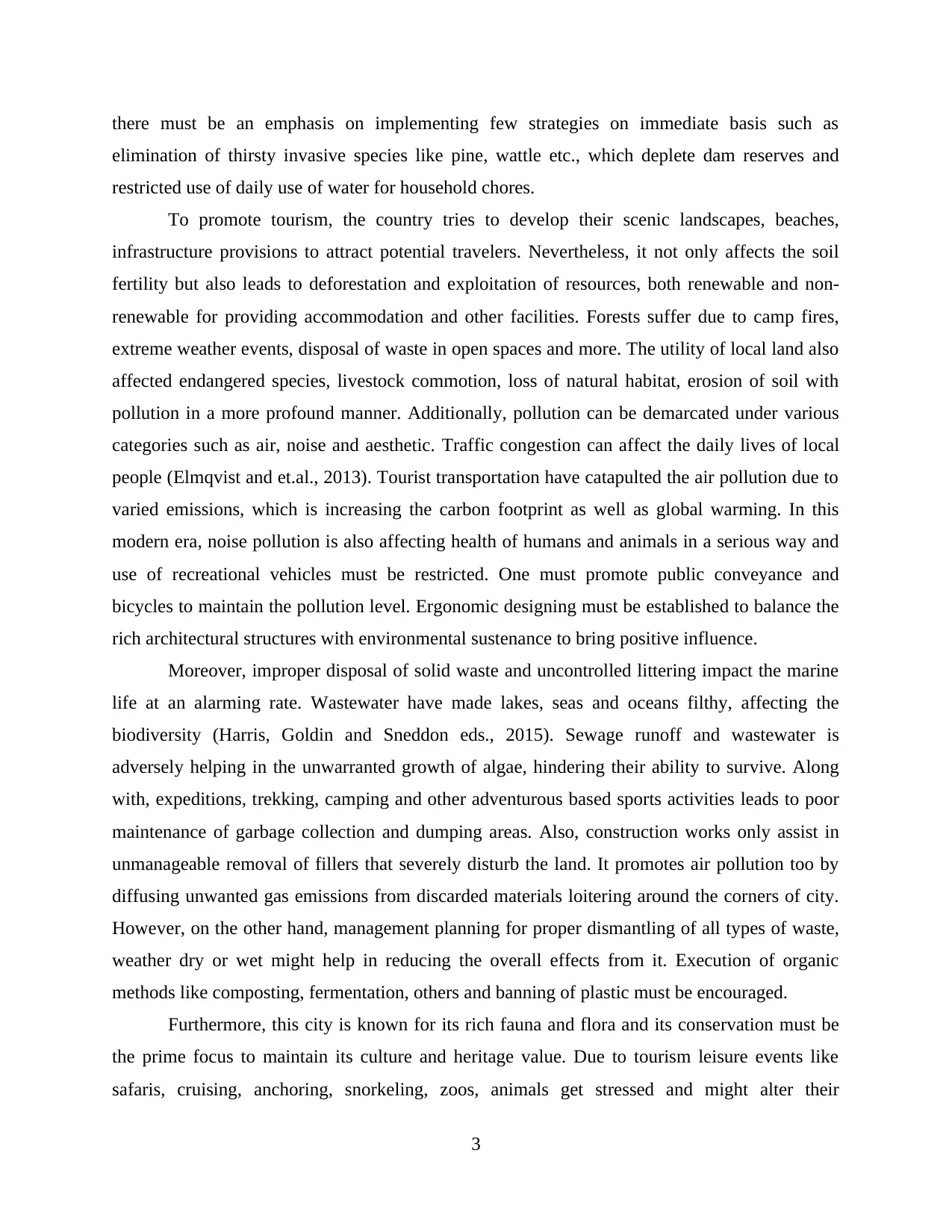
there must be an emphasis on implementing few strategies on immediate basis such as
elimination of thirsty invasive species like pine, wattle etc., which deplete dam reserves and
restricted use of daily use of water for household chores.
To promote tourism, the country tries to develop their scenic landscapes, beaches,
infrastructure provisions to attract potential travelers. Nevertheless, it not only affects the soil
fertility but also leads to deforestation and exploitation of resources, both renewable and non-
renewable for providing accommodation and other facilities. Forests suffer due to camp fires,
extreme weather events, disposal of waste in open spaces and more. The utility of local land also
affected endangered species, livestock commotion, loss of natural habitat, erosion of soil with
pollution in a more profound manner. Additionally, pollution can be demarcated under various
categories such as air, noise and aesthetic. Traffic congestion can affect the daily lives of local
people (Elmqvist and et.al., 2013). Tourist transportation have catapulted the air pollution due to
varied emissions, which is increasing the carbon footprint as well as global warming. In this
modern era, noise pollution is also affecting health of humans and animals in a serious way and
use of recreational vehicles must be restricted. One must promote public conveyance and
bicycles to maintain the pollution level. Ergonomic designing must be established to balance the
rich architectural structures with environmental sustenance to bring positive influence.
Moreover, improper disposal of solid waste and uncontrolled littering impact the marine
life at an alarming rate. Wastewater have made lakes, seas and oceans filthy, affecting the
biodiversity (Harris, Goldin and Sneddon eds., 2015). Sewage runoff and wastewater is
adversely helping in the unwarranted growth of algae, hindering their ability to survive. Along
with, expeditions, trekking, camping and other adventurous based sports activities leads to poor
maintenance of garbage collection and dumping areas. Also, construction works only assist in
unmanageable removal of fillers that severely disturb the land. It promotes air pollution too by
diffusing unwanted gas emissions from discarded materials loitering around the corners of city.
However, on the other hand, management planning for proper dismantling of all types of waste,
weather dry or wet might help in reducing the overall effects from it. Execution of organic
methods like composting, fermentation, others and banning of plastic must be encouraged.
Furthermore, this city is known for its rich fauna and flora and its conservation must be
the prime focus to maintain its culture and heritage value. Due to tourism leisure events like
safaris, cruising, anchoring, snorkeling, zoos, animals get stressed and might alter their
3
elimination of thirsty invasive species like pine, wattle etc., which deplete dam reserves and
restricted use of daily use of water for household chores.
To promote tourism, the country tries to develop their scenic landscapes, beaches,
infrastructure provisions to attract potential travelers. Nevertheless, it not only affects the soil
fertility but also leads to deforestation and exploitation of resources, both renewable and non-
renewable for providing accommodation and other facilities. Forests suffer due to camp fires,
extreme weather events, disposal of waste in open spaces and more. The utility of local land also
affected endangered species, livestock commotion, loss of natural habitat, erosion of soil with
pollution in a more profound manner. Additionally, pollution can be demarcated under various
categories such as air, noise and aesthetic. Traffic congestion can affect the daily lives of local
people (Elmqvist and et.al., 2013). Tourist transportation have catapulted the air pollution due to
varied emissions, which is increasing the carbon footprint as well as global warming. In this
modern era, noise pollution is also affecting health of humans and animals in a serious way and
use of recreational vehicles must be restricted. One must promote public conveyance and
bicycles to maintain the pollution level. Ergonomic designing must be established to balance the
rich architectural structures with environmental sustenance to bring positive influence.
Moreover, improper disposal of solid waste and uncontrolled littering impact the marine
life at an alarming rate. Wastewater have made lakes, seas and oceans filthy, affecting the
biodiversity (Harris, Goldin and Sneddon eds., 2015). Sewage runoff and wastewater is
adversely helping in the unwarranted growth of algae, hindering their ability to survive. Along
with, expeditions, trekking, camping and other adventurous based sports activities leads to poor
maintenance of garbage collection and dumping areas. Also, construction works only assist in
unmanageable removal of fillers that severely disturb the land. It promotes air pollution too by
diffusing unwanted gas emissions from discarded materials loitering around the corners of city.
However, on the other hand, management planning for proper dismantling of all types of waste,
weather dry or wet might help in reducing the overall effects from it. Execution of organic
methods like composting, fermentation, others and banning of plastic must be encouraged.
Furthermore, this city is known for its rich fauna and flora and its conservation must be
the prime focus to maintain its culture and heritage value. Due to tourism leisure events like
safaris, cruising, anchoring, snorkeling, zoos, animals get stressed and might alter their
3
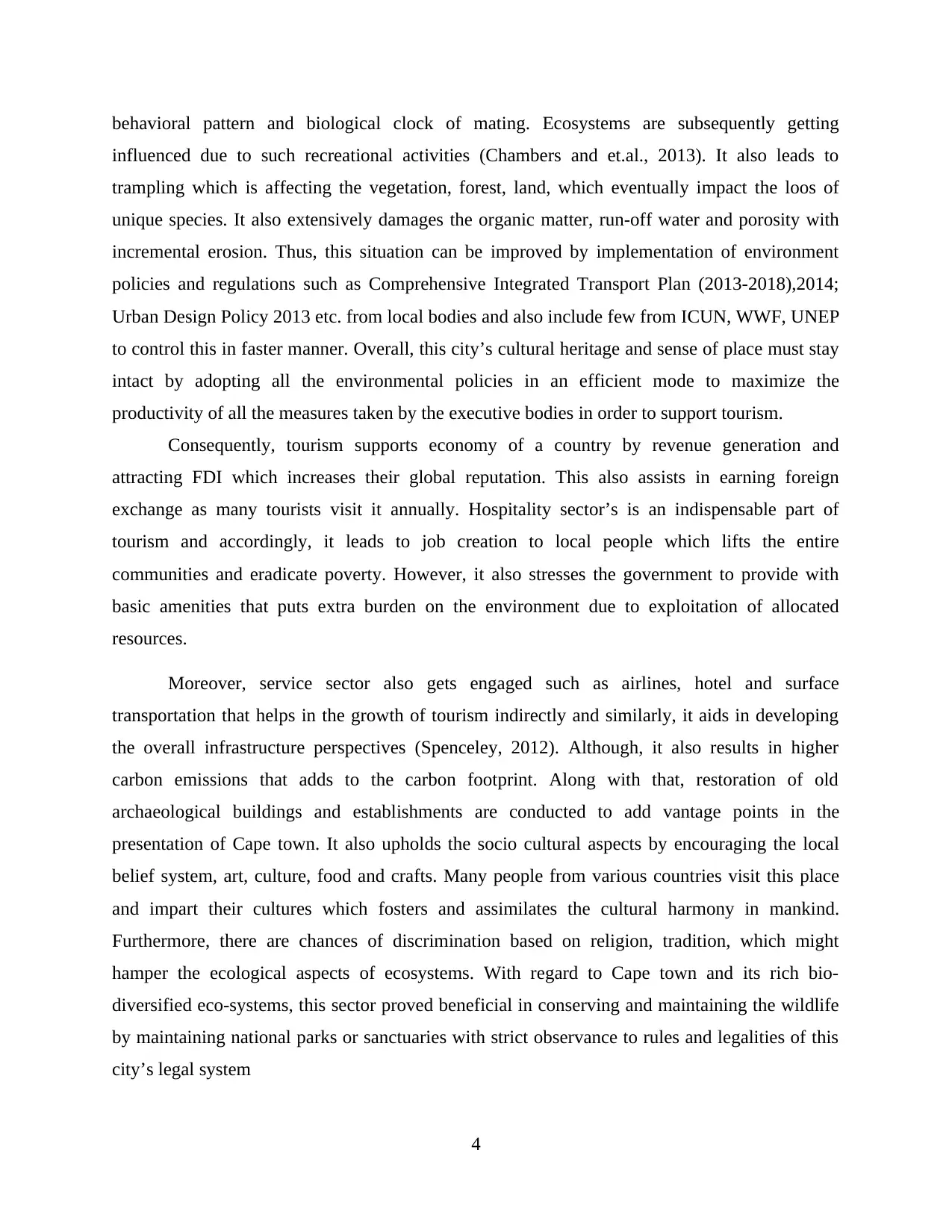
behavioral pattern and biological clock of mating. Ecosystems are subsequently getting
influenced due to such recreational activities (Chambers and et.al., 2013). It also leads to
trampling which is affecting the vegetation, forest, land, which eventually impact the loos of
unique species. It also extensively damages the organic matter, run-off water and porosity with
incremental erosion. Thus, this situation can be improved by implementation of environment
policies and regulations such as Comprehensive Integrated Transport Plan (2013-2018),2014;
Urban Design Policy 2013 etc. from local bodies and also include few from ICUN, WWF, UNEP
to control this in faster manner. Overall, this city’s cultural heritage and sense of place must stay
intact by adopting all the environmental policies in an efficient mode to maximize the
productivity of all the measures taken by the executive bodies in order to support tourism.
Consequently, tourism supports economy of a country by revenue generation and
attracting FDI which increases their global reputation. This also assists in earning foreign
exchange as many tourists visit it annually. Hospitality sector’s is an indispensable part of
tourism and accordingly, it leads to job creation to local people which lifts the entire
communities and eradicate poverty. However, it also stresses the government to provide with
basic amenities that puts extra burden on the environment due to exploitation of allocated
resources.
Moreover, service sector also gets engaged such as airlines, hotel and surface
transportation that helps in the growth of tourism indirectly and similarly, it aids in developing
the overall infrastructure perspectives (Spenceley, 2012). Although, it also results in higher
carbon emissions that adds to the carbon footprint. Along with that, restoration of old
archaeological buildings and establishments are conducted to add vantage points in the
presentation of Cape town. It also upholds the socio cultural aspects by encouraging the local
belief system, art, culture, food and crafts. Many people from various countries visit this place
and impart their cultures which fosters and assimilates the cultural harmony in mankind.
Furthermore, there are chances of discrimination based on religion, tradition, which might
hamper the ecological aspects of ecosystems. With regard to Cape town and its rich bio-
diversified eco-systems, this sector proved beneficial in conserving and maintaining the wildlife
by maintaining national parks or sanctuaries with strict observance to rules and legalities of this
city’s legal system
4
influenced due to such recreational activities (Chambers and et.al., 2013). It also leads to
trampling which is affecting the vegetation, forest, land, which eventually impact the loos of
unique species. It also extensively damages the organic matter, run-off water and porosity with
incremental erosion. Thus, this situation can be improved by implementation of environment
policies and regulations such as Comprehensive Integrated Transport Plan (2013-2018),2014;
Urban Design Policy 2013 etc. from local bodies and also include few from ICUN, WWF, UNEP
to control this in faster manner. Overall, this city’s cultural heritage and sense of place must stay
intact by adopting all the environmental policies in an efficient mode to maximize the
productivity of all the measures taken by the executive bodies in order to support tourism.
Consequently, tourism supports economy of a country by revenue generation and
attracting FDI which increases their global reputation. This also assists in earning foreign
exchange as many tourists visit it annually. Hospitality sector’s is an indispensable part of
tourism and accordingly, it leads to job creation to local people which lifts the entire
communities and eradicate poverty. However, it also stresses the government to provide with
basic amenities that puts extra burden on the environment due to exploitation of allocated
resources.
Moreover, service sector also gets engaged such as airlines, hotel and surface
transportation that helps in the growth of tourism indirectly and similarly, it aids in developing
the overall infrastructure perspectives (Spenceley, 2012). Although, it also results in higher
carbon emissions that adds to the carbon footprint. Along with that, restoration of old
archaeological buildings and establishments are conducted to add vantage points in the
presentation of Cape town. It also upholds the socio cultural aspects by encouraging the local
belief system, art, culture, food and crafts. Many people from various countries visit this place
and impart their cultures which fosters and assimilates the cultural harmony in mankind.
Furthermore, there are chances of discrimination based on religion, tradition, which might
hamper the ecological aspects of ecosystems. With regard to Cape town and its rich bio-
diversified eco-systems, this sector proved beneficial in conserving and maintaining the wildlife
by maintaining national parks or sanctuaries with strict observance to rules and legalities of this
city’s legal system
4
⊘ This is a preview!⊘
Do you want full access?
Subscribe today to unlock all pages.

Trusted by 1+ million students worldwide
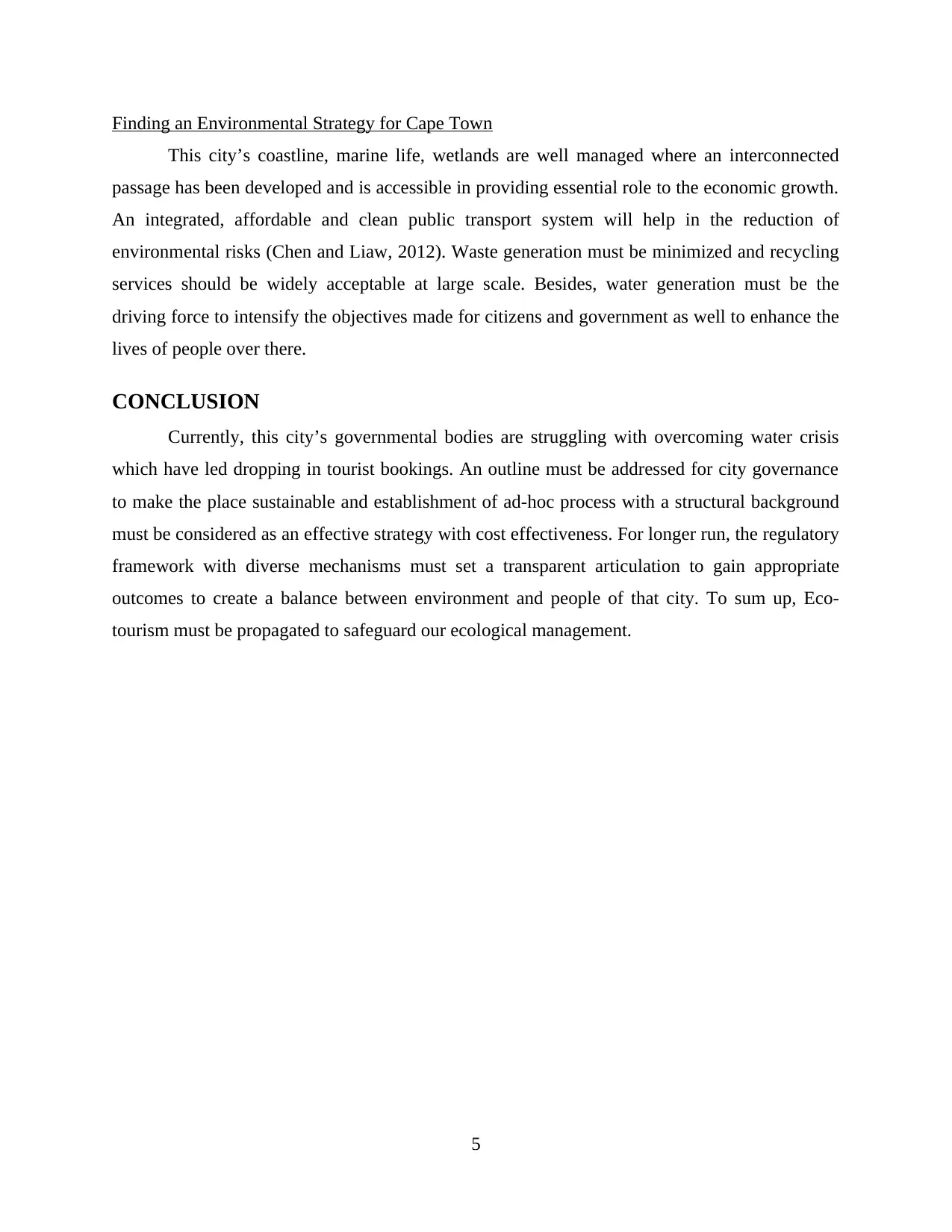
Finding an Environmental Strategy for Cape Town
This city’s coastline, marine life, wetlands are well managed where an interconnected
passage has been developed and is accessible in providing essential role to the economic growth.
An integrated, affordable and clean public transport system will help in the reduction of
environmental risks (Chen and Liaw, 2012). Waste generation must be minimized and recycling
services should be widely acceptable at large scale. Besides, water generation must be the
driving force to intensify the objectives made for citizens and government as well to enhance the
lives of people over there.
CONCLUSION
Currently, this city’s governmental bodies are struggling with overcoming water crisis
which have led dropping in tourist bookings. An outline must be addressed for city governance
to make the place sustainable and establishment of ad-hoc process with a structural background
must be considered as an effective strategy with cost effectiveness. For longer run, the regulatory
framework with diverse mechanisms must set a transparent articulation to gain appropriate
outcomes to create a balance between environment and people of that city. To sum up, Eco-
tourism must be propagated to safeguard our ecological management.
5
This city’s coastline, marine life, wetlands are well managed where an interconnected
passage has been developed and is accessible in providing essential role to the economic growth.
An integrated, affordable and clean public transport system will help in the reduction of
environmental risks (Chen and Liaw, 2012). Waste generation must be minimized and recycling
services should be widely acceptable at large scale. Besides, water generation must be the
driving force to intensify the objectives made for citizens and government as well to enhance the
lives of people over there.
CONCLUSION
Currently, this city’s governmental bodies are struggling with overcoming water crisis
which have led dropping in tourist bookings. An outline must be addressed for city governance
to make the place sustainable and establishment of ad-hoc process with a structural background
must be considered as an effective strategy with cost effectiveness. For longer run, the regulatory
framework with diverse mechanisms must set a transparent articulation to gain appropriate
outcomes to create a balance between environment and people of that city. To sum up, Eco-
tourism must be propagated to safeguard our ecological management.
5
Paraphrase This Document
Need a fresh take? Get an instant paraphrase of this document with our AI Paraphraser
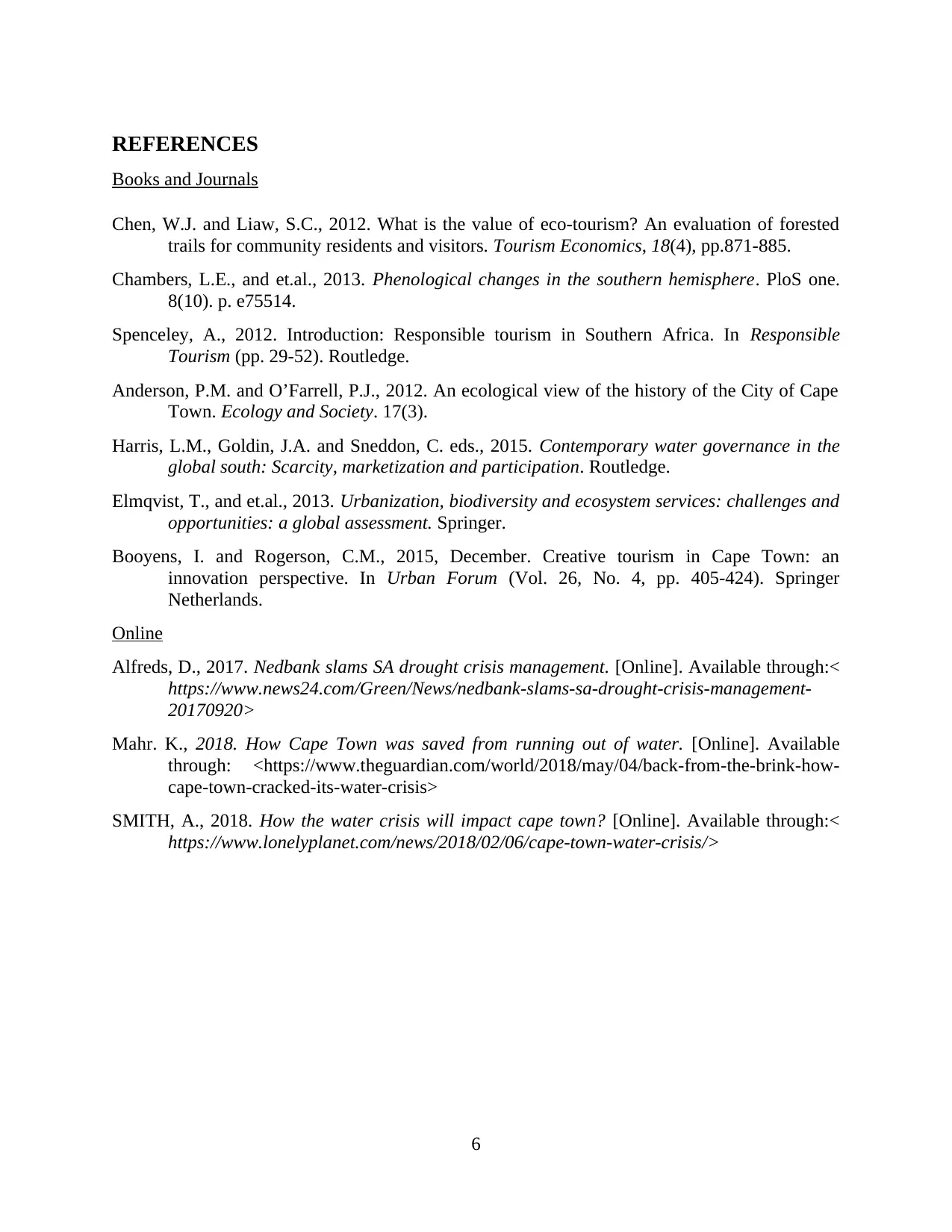
REFERENCES
Books and Journals
Chen, W.J. and Liaw, S.C., 2012. What is the value of eco-tourism? An evaluation of forested
trails for community residents and visitors. Tourism Economics, 18(4), pp.871-885.
Chambers, L.E., and et.al., 2013. Phenological changes in the southern hemisphere. PloS one.
8(10). p. e75514.
Spenceley, A., 2012. Introduction: Responsible tourism in Southern Africa. In Responsible
Tourism (pp. 29-52). Routledge.
Anderson, P.M. and O’Farrell, P.J., 2012. An ecological view of the history of the City of Cape
Town. Ecology and Society. 17(3).
Harris, L.M., Goldin, J.A. and Sneddon, C. eds., 2015. Contemporary water governance in the
global south: Scarcity, marketization and participation. Routledge.
Elmqvist, T., and et.al., 2013. Urbanization, biodiversity and ecosystem services: challenges and
opportunities: a global assessment. Springer.
Booyens, I. and Rogerson, C.M., 2015, December. Creative tourism in Cape Town: an
innovation perspective. In Urban Forum (Vol. 26, No. 4, pp. 405-424). Springer
Netherlands.
Online
Alfreds, D., 2017. Nedbank slams SA drought crisis management. [Online]. Available through:<
https://www.news24.com/Green/News/nedbank-slams-sa-drought-crisis-management-
20170920>
Mahr. K., 2018. How Cape Town was saved from running out of water. [Online]. Available
through: <https://www.theguardian.com/world/2018/may/04/back-from-the-brink-how-
cape-town-cracked-its-water-crisis>
SMITH, A., 2018. How the water crisis will impact cape town? [Online]. Available through:<
https://www.lonelyplanet.com/news/2018/02/06/cape-town-water-crisis/>
6
Books and Journals
Chen, W.J. and Liaw, S.C., 2012. What is the value of eco-tourism? An evaluation of forested
trails for community residents and visitors. Tourism Economics, 18(4), pp.871-885.
Chambers, L.E., and et.al., 2013. Phenological changes in the southern hemisphere. PloS one.
8(10). p. e75514.
Spenceley, A., 2012. Introduction: Responsible tourism in Southern Africa. In Responsible
Tourism (pp. 29-52). Routledge.
Anderson, P.M. and O’Farrell, P.J., 2012. An ecological view of the history of the City of Cape
Town. Ecology and Society. 17(3).
Harris, L.M., Goldin, J.A. and Sneddon, C. eds., 2015. Contemporary water governance in the
global south: Scarcity, marketization and participation. Routledge.
Elmqvist, T., and et.al., 2013. Urbanization, biodiversity and ecosystem services: challenges and
opportunities: a global assessment. Springer.
Booyens, I. and Rogerson, C.M., 2015, December. Creative tourism in Cape Town: an
innovation perspective. In Urban Forum (Vol. 26, No. 4, pp. 405-424). Springer
Netherlands.
Online
Alfreds, D., 2017. Nedbank slams SA drought crisis management. [Online]. Available through:<
https://www.news24.com/Green/News/nedbank-slams-sa-drought-crisis-management-
20170920>
Mahr. K., 2018. How Cape Town was saved from running out of water. [Online]. Available
through: <https://www.theguardian.com/world/2018/may/04/back-from-the-brink-how-
cape-town-cracked-its-water-crisis>
SMITH, A., 2018. How the water crisis will impact cape town? [Online]. Available through:<
https://www.lonelyplanet.com/news/2018/02/06/cape-town-water-crisis/>
6
1 out of 8
Related Documents
Your All-in-One AI-Powered Toolkit for Academic Success.
+13062052269
info@desklib.com
Available 24*7 on WhatsApp / Email
![[object Object]](/_next/static/media/star-bottom.7253800d.svg)
Unlock your academic potential
Copyright © 2020–2026 A2Z Services. All Rights Reserved. Developed and managed by ZUCOL.





